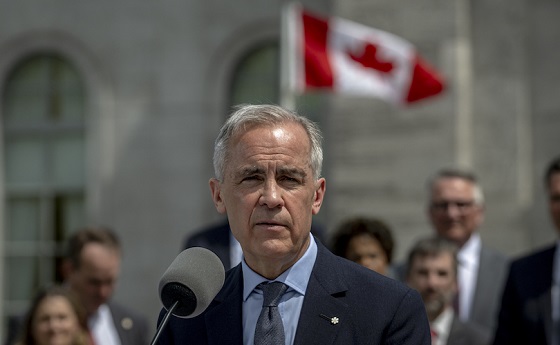Health
Lack of adequate health care pushing Canadians toward assisted suicide

From LifeSiteNews
The family of an elderly man is speaking out about the terrible hospital conditions that led their father to request euthanasia before he died of natural causes.
The family of Cleo Gratton, an 84-year-old retired diamond driller who died earlier this month in Chelmsford, Ontario, of natural causes after being approved for assisted suicide, is speaking publicly about their appalling experience in the Canadian healthcare system.
According to the CBC, the elderly man “told his family he would rather die than go back to Health Sciences North in Sudbury,” and that a recent stay there found Gratton, who was suffering from heart disease and kidney failure, spending one night in the emergency room and then being transferred to a bed sitting in the hallway on the seventh floor.
“There were no lights, all the bulbs in that hallway had been completely removed,” his daughter, Lynn, told the CBC. “The only light we had was almost like a desk lamp that had been bolted to the wall. Patients are passing by, nurses are going by, no privacy, no compassion, no dignity.” The visit took place in mid-October, after which Gratton decided to apply for “medical aid in dying,” or assisted suicide.
Lynn said that nurses had to use headlamps to inspect her father’s feet, and that the experience was “just one thing after another and it really opened our eyes to what’s going on in our hospitals. My dad said, ‘Push, push, push for change. Make people aware of what’s gong on. Open the discussion, bring it to your MP, your MPP, keep going straight up.”
His family is now honoring his wishes to speak out about his experience. The doctors and nurses, Lynn emphasized, were “amazing,” but she noted that they seem overworked. “Why are they still taking in patients if we have an overcrowding issue and they have no place to put these people?” she said.
Cleo Gratton, who died of natural causes surrounded by his family before he could go through with assisted suicide, is just the most recent of many examples of Canadians opting for assisted suicide because they could not access the care that they actually desired.
In Quebec last year, Norman Meunier, a quadriplegic man, developed bedsores after four days left on an ER stretcher without a good mattress. That experience combined with lack of available homecare pushed him to request, and receive, assisted suicide.
An unnamed woman in her 80s, referred to in a MAID report as “Mrs. B,” received MAID earlier this year after requesting but being denied palliative or hospice care. Instead, with her spouse burning out as the result of her care, a rushed MAID assessment was completed, and she died by lethal injection.
In 2022, 44-year-old Winnipeg woman Sathya Dhara Khovac died by euthanasia after failing to receive the homecare resources she had desperately sought. In her posthumous obituary, she said she could have had more time if she’d had more help.
In 2019, 41-year-old Sean Tagert was euthanized after spending years attempting to find and fund the homecare and resources he needed to stay in the community where his son lived. He did not want to die but felt that he had no other choice.
And, among other stories, at least four Canadian veterans were offered assisted suicide in lieu of the unavailable mental health supports they were requesting.
Stories of Canadians seeking palliative care, mental health resources, homecare, and other medical support finding that the only option available to them is assisted suicide have become routine over the past several years. Euthanasia has become a pressure valve for an overworked and under-funded healthcare system serving an aging population increasingly need of complex care — and if assisted suicide for mental illness is legalize, things will get much, much worse.
Dr John Campbell
Cures for Cancer? A new study shows incredible results from cheap generic drug Fenbendazole

From Dr. John Campbell
You won’t hear much about Fenbendazole from the regular pipeline of medical information. There could be many reasons for that. For one, it’s primarily known for it’s use in veterinary medicine. Somehow during COVID the medical information pipeline convinced millions that if a drug is used on horses or other animals it couldn’t work for humans. Not sure how they got away with that one considering the use of animal trials for much of modern medical history.
Another possible reason, one that makes at least as much sense, is that there’s no business case for Fenbendazole. It’s been around for decades and its patent expired in the early 1990’s. That means it’s considered a generic drug that a pharmaceutical company from India could (and does) produce in mass quantities for very little profit (compared to non-generics).
So Fenbendazole is an inexpensive, widely accessible antiparasitic drug used in veterinary medicine. During the COVID pandemic a number of doctors, desperate for a suitable treatment, tried it with reportedly great levels of success. Over some time they discovered it might be useful elsewhere. Some doctors are using Fenbendazole to help treat late stage cancer. Often this is prescribed when the regular treatments clearly aren’t working and cancer is approaching or has already been declared stage 4.
What they’ve found at least in some cases is astounding results. This has resulted in a new study which medical researcher Dr. John Campbell shares in this video.
Addictions
Canadian gov’t not stopping drug injection sites from being set up near schools, daycares

From LifeSiteNews
Canada’s health department told MPs there is not a minimum distance requirement between safe consumption sites and schools, daycares or playgrounds.
So-called “safe” drug injection sites do not require a minimum distance from schools, daycares, or even playgrounds, Health Canada has stated, and that has puzzled some MPs.
Canadian Health Minister Marjorie Michel recently told MPs that it was not up to the federal government to make rules around where drug use sites could be located.
“Health Canada does not set a minimum distance requirement between safe consumption sites and nearby locations such as schools, daycares or playgrounds,” the health department wrote in a submission to the House of Commons health committee.
“Nor does the department collect or maintain a comprehensive list of addresses for these facilities in Canada.”
Records show that there are 31 such “safe” injection sites allowed under the Controlled Drugs And Substances Act in six Canadian provinces. There are 13 are in Ontario, five each in Alberta, Quebec, and British Columbia, and two in Saskatchewan and one in Nova Scotia.
The department noted, as per Blacklock’s Reporter, that it considers the location of each site before approving it, including “expressions of community support or opposition.”
Michel had earlier told the committee that it was not her job to decide where such sites are located, saying, “This does not fall directly under my responsibility.”
Conservative MP Dan Mazier had asked for limits on where such “safe” injection drug sites would be placed, asking Michel in a recent committee meeting, “Do you personally review the applications before they’re approved?”
Michel said that “(a)pplications are reviewed by the department.”
Mazier stated, “Are you aware your department is approving supervised consumption sites next to daycares, schools and playgrounds?”
Michel said, “Supervised consumption sites were created to prevent overdose deaths.”
Mazier continued to press Michel, asking her how many “supervised consumption sites approved by your department are next to daycares.”
“I couldn’t tell you exactly how many,” Michel replied.
Mazier was mum on whether or not her department would commit to not approving such sites near schools, playgrounds, or daycares.
An injection site in Montreal, which opened in 2024, is located close to a kindergarten playground.
Conservative Party leader Pierre Poilievre has called such sites “drug dens” and has blasted them as not being “safe” and “disasters.”
Records show that the Liberal government has spent approximately $820 million from 2017 to 2022 on its Canadian Drugs and Substances Strategy. However, even Canada’s own Department of Health admitted in a 2023 report that the Liberals’ drug program only had “minimal” results.
Recently, LifeSiteNews reported that the British Columbia government decided to stop a so-called “safe supply” free drug program in light of a report revealing many of the hard drugs distributed via pharmacies were resold on the black market.
British Columbia Premier David Eby recently admitted that allowing the decriminalization of hard drugs in British Columbia via a federal pilot program was a mistake.
Former Prime Minister Justin Trudeau’s loose drug initiatives were deemed such a disaster in British Columbia that Eby’s government asked Trudeau to re-criminalize narcotic use in public spaces, a request that was granted.
Official figures show that overdoses went up during the decriminalization trial, with 3,313 deaths over 15 months, compared with 2,843 in the same time frame before drugs were temporarily legalized.
-

 Addictions1 day ago
Addictions1 day agoCanadian gov’t not stopping drug injection sites from being set up near schools, daycares
-

 Business1 day ago
Business1 day agoParliamentary Budget Officer begs Carney to cut back on spending
-

 Business1 day ago
Business1 day agoCarney government needs stronger ‘fiscal anchors’ and greater accountability
-

 Education1 day ago
Education1 day agoWhy classroom size isn’t the issue teacher unions think it is
-

 Alberta24 hours ago
Alberta24 hours agoFederal budget: It’s not easy being green
-

 Fraser Institute2 days ago
Fraser Institute2 days agoCourts and governments caused B.C.’s property crisis—they’re not about to fix it
-

 Alberta1 day ago
Alberta1 day agoChatGPT may explain why gap between report card grades and standardized test scores is getting bigger
-

 Energy24 hours ago
Energy24 hours agoA picture is worth a thousand spreadsheets










